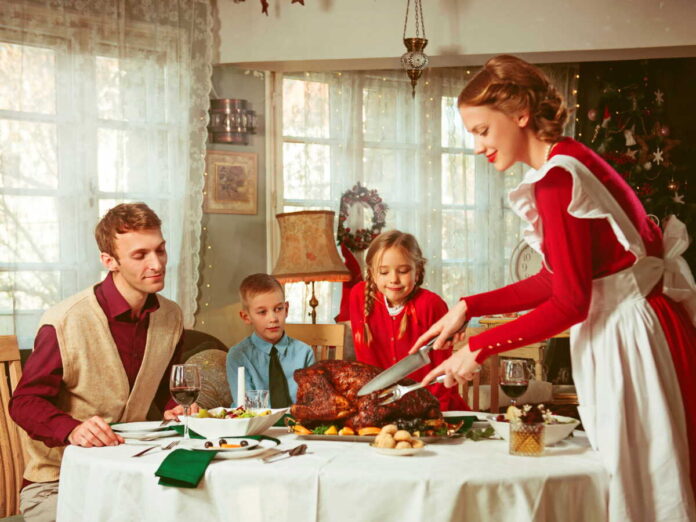The concept of “Trad Wives” (traditional wives) is a contemporary trend heavily promoted on social media, particularly on TikTok and Instagram.
They have a recognisable and carefully crafted image. They are women who “choose” to stay at home, devote themselves to caring for their children and husbands, cook and clean, give up their jobs and live within the confines of traditional family roles. They are always well-groomed, modest and smiling. They wear 1950s-style dresses and their homes are tidy and smell of freshly baked cake. They wait for their husbands to come home from work so they can serve them dinner, presenting themselves as the “queens of their homes”.
Some of the best-known figures include Nara Smith, Hannah Neeleman (Ballerina Farm), Estee Williams and Rebecca Jackson.
A political tool
In reality, however, this trend is far from innocent. It is a political tool that perpetuates one of the most conservative forms of patriarchy and is ideologically fuelled by the far right.
Internationally, the far right exploits this fairy tale to bring traditional gender roles back to the forefront and cultivate the perception that women naturally belong at home, should not work — especially after giving birth (this is exclusively the man’s job) — and are happy and fulfilled when taking care of their children, husbands and homes.
Hannah Neeleman looks after her husband and eight children, while also running a farm, all while looking like a model. Trad Wives prepare all meals and desserts from scratch, without using ready-made ingredients, because they “care” about their family’s health. Nara Smith cooks in dresses that would make the models on TV shows envious, and explains her recipes in a soft, seductive voice. Estee Williams, who looks like Marilyn Monroe, talks about how women can suffer burnout trying to fulfil the dual roles of working woman and housewife. She also gives advice on how a woman can quit her job to become a traditional wife. Williams discusses how traditional wives support biblical teachings on the subordination of women to men, while claiming this does not imply that women are inferior. She argues that traditional wives have become a “trend” on social media because they provide role models at a time when the boundaries between the sexes and their respective roles have become blurred.
Romanticising housework
It’s all a strategy. They romanticise housework and childcare to an unbelievable extent (seriously, how can a woman with eight children possibly cook all day while also getting dressed and doing her hair?). They present economic dependence and subordination as love. Their aim is to take away women’s rights to work and independence, destroy personal autonomy and make women dependent, since they won’t be working and therefore won’t have an income — relying instead on the man, who is the head of the family. Under the guise of “tradition”, there is an attempt to return to a society that wants women silent, dependent and politically inactive.
Because it is presented in such an idealised and romanticised way, complete with colourful filters and vintage aesthetics, it can easily influence younger girls and women. This creates toxic role models and cultivates the “dream” of not working: staying at home and serving one’s husband and children all day. Under the guise of traditional values, protecting the family and the idea that children need their mothers, a worldview is promoted that seeks to confine women to the private sphere and remove them from public life, politics and economic autonomy. This perception denies women the right to decide for themselves about their own lives.
Not going back
This trend ignores, bypasses and criticises 150 years of struggle for women’s emancipation, attempting once again to silence the women’s movement and subordinate women. We cannot forget the British suffragettes, who fought for the right to vote through demonstrations, hunger strikes and imprisonment. In the US, women working in textile factories went on strike in 1909 to demand better working conditions and an eight-hour workday. Socialist and communist women fought not only for the right to vote, but also for equal pay and for social welfare structures such as nurseries for working women. During World War II, women in the resistance left their homes to fight for freedom and social emancipation. In the 1960s and 1970s, feminist movements campaigned for the right to contraception and abortion, as well as for equal opportunities in the workplace. In Greece, these struggles after the transition to democracy led to the 1983 family law, which enshrined equality in marriage, recognised children born out of wedlock and banned dowries.
Unpaid domestic work is not an act of love; it is exploitation. The idea that women’s place is in the home is not neutral — it is an ideological weapon that limits independence and perpetuates class and gender inequality.
The answer is not to go back, but to move forward towards equality, collective liberation and justice. We need a society in which women can decide for themselves about their own lives and their bodies; a society in which no woman has to choose between a career and a family (whatever form that may take).
Trad wives are therefore not innocent images of domesticity and love. They are tools of the far right and patriarchy — the crutches of capitalism — that try to convince us to surrender the freedoms and rights won through struggle and bloodshed. In the face of this romanticised prison, the answer is collective: feminism and class struggle for a world in which no woman will have to choose between her self-evident rights and being trapped in specific roles.
We will not turn back; we will continue to fight until we build an equal, truly free and feminist society- a socialist one!



